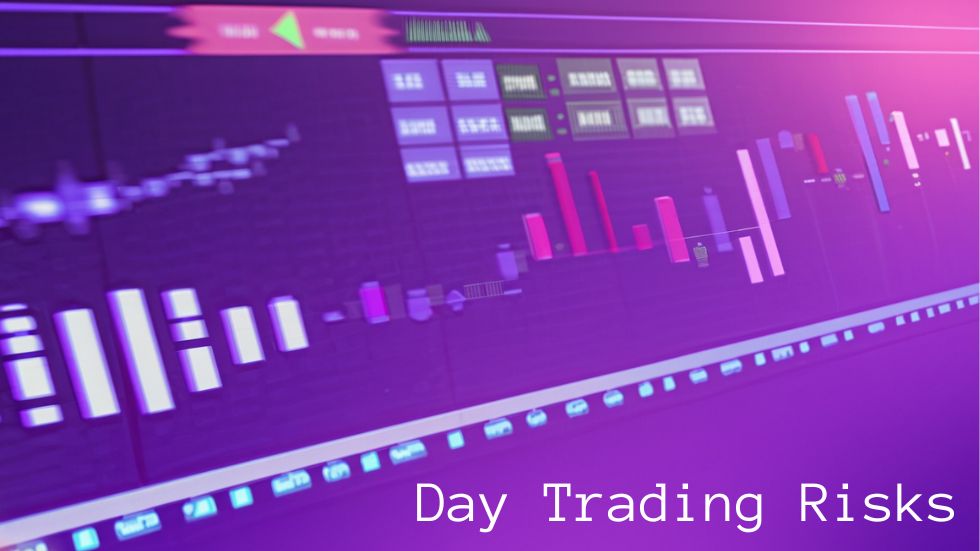What is Day trading?
Day trading is a type of trading in which buyers try to make money from short-term price changes in the market by buying and selling quickly. This type of trading is different from long-term spending because it is focused on short-term gains and is usually done daily or weekly.
Investors often use a number of different techniques when day trading, such as scalping, momentum trading, and swing trading. Before making any deals, investors should think about the type of product they are trading and the style of dealing that fits their risk profile the best. While it does have its pros, Day trading risks are quite rigid in nature
Day trading is a good way to trade if you want to take advantage of short-term price changes. If you do it right, it can be very rewarding. But it’s also important to know what the risks and benefits of this approach are. Day trading is a high-risk, high-reward approach. To avoid taking on too much risk, you need to understand how the market works and how to handle it.
Day Trading Risks:
High Volatility:
Day trading is when you buy and sell financial products all at once. predict Due to the possibility of economic factors, corporate news, or even social media trends, price changes that occur quickly can be challenging to predict. Because short-term trades are risky, traders are more likely to lose a lot of money when the market goes up and down. Due to the possibility of economic factors, corporate news, or even social media trends, price changes that occur quickly can be challenging to predict.
Expert data:
Several studies show that high volatility causes a lot of financial losses for day traders, and most of them can’t make steady gains over the long term.
Insufficient research and lack of knowledge:
Inadequate Research and Lack of Knowledge: Successful day trading demands a comprehensive understanding of the financial markets, including macroeconomic factors, industry trends, and individual company analysis. Without doing a lot of study, day traders might make bad choices based on rumors or information they can’t confirm, which could cost them a lot of money.
Expert Research
Research has shown that many day traders don’t have the information and critical skills they need to make good decisions about the market. This lack of understanding makes it more likely that bad trade decisions will be made, which can lead to financial losses.
Psychological Factors:
The psychological side of trading is a very important part of being successful at day trading. This approach is fast-paced and can make you feel a lot of emotions, which can make you make hasty decisions, trade too much, and take too many risks. Fear, greed, and the desire to chase losses are all common mental traps that can make it hard to make money.
Expert Data
Studies show that psychological flaws have a big effect on the results of day trading, with emotional decision-making leading to less-than-ideal results. Too much trust and a lack of control can make these problems even worse.
Financial and mental costs:
Day trading can cost people money and make them feel bad about themselves. Costs like charges, fees, and bid-ask gaps, which are connected with buying often, can cut into possible earnings. Also, the pressure to make regular profits and the possibility of losing a lot of money can cause a lot of mental stress.
Expert analysis:
Studies have shown that day traders often feel very stressed out and emotionally drained. The constant push to do better and the wild ups and downs of the market can make people feel burned out and hurt their mental health.
How to cut down on the risks of day trading
Education and Knowledge:
Invest in your schooling and learn as much as you can about the financial markets, basic analysis, managing risks, and trading techniques. Keep learning new things so you can adapt to changing market situations.
Risk Management:
Make a clear plan for risk management that includes setting stop-loss orders and sticking to the risk-reward ratios you’ve already decided on. Don’t put a big chunk of your money at risk on a single trade.
Strategy Development:
Make a solid trade strategy that fits your risk level, financial goals, and trading style. Before you use it in real life, you should test your technique on facts from the past.
Emotional Discipline:
To develop emotional discipline, set realistic goals, keep a trade log to track your actions, and take breaks often to relieve stress. Don’t make quick choices out of fear or greed.
Start Small and Gain Experience:
Start with a small trading account and slowly add more money as you gain experience and show that you can consistently make money. This method allows for a limited learning curve and keeps possible losses to a minimum.
Conclusion
In the end, day trading can be a profitable way to spend money, but it’s important to be aware of the possible risks and dangers before you start. When you start day trading, make sure to weigh the possible benefits against the risks and be careful. Day trading can also be financially stressful
Don’t forget that spending wisely requires a whole-person approach that puts patience, focus, and a well-thought-out investment plan at the top of the list.

